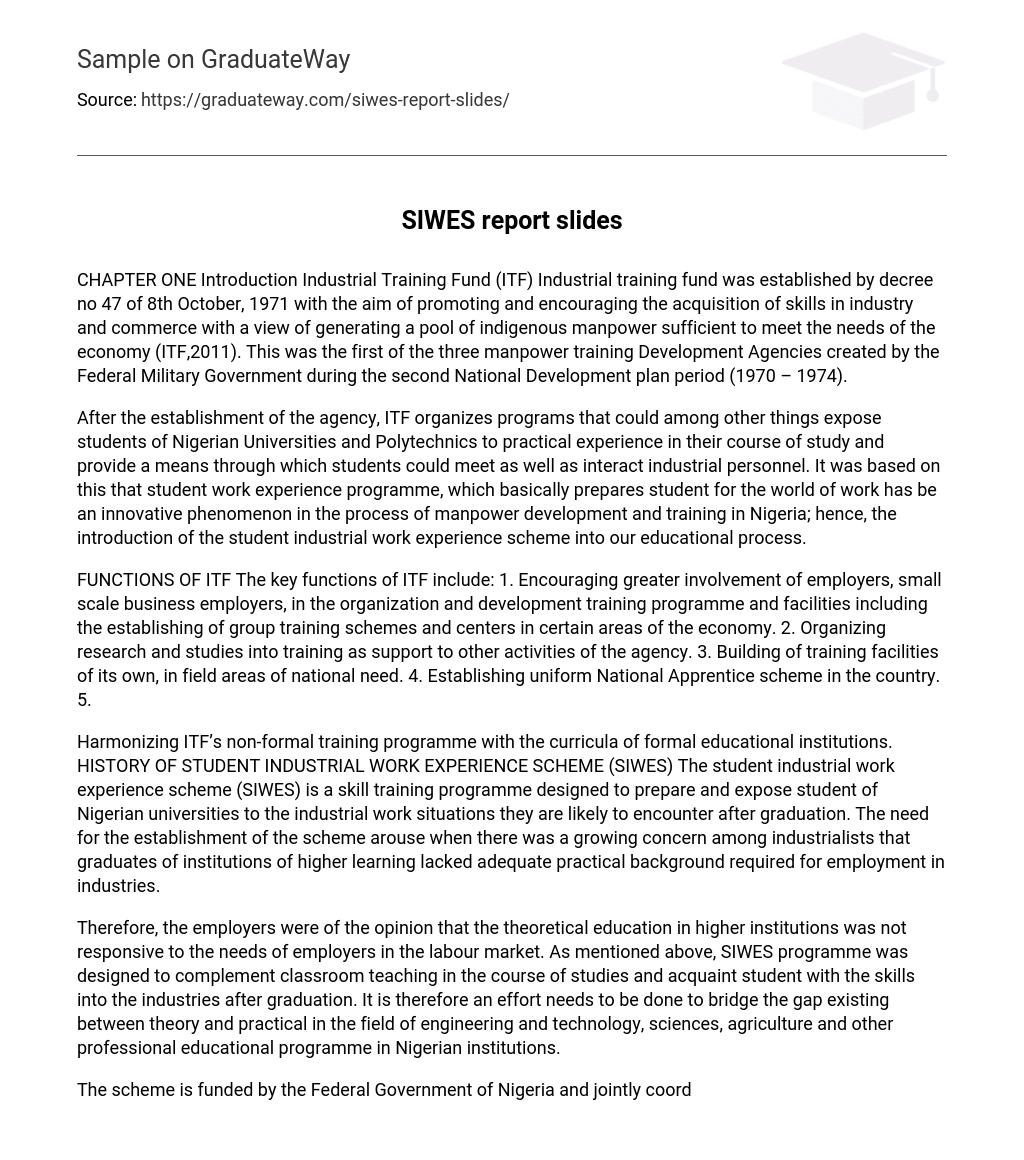CHAPTER ONE Introduction Industrial Training Fund (ITF) Industrial training fund was established by decree no 47 of 8th October, 1971 with the aim of promoting and encouraging the acquisition of skills in industry and commerce with a view of generating a pool of indigenous manpower sufficient to meet the needs of the economy (ITF,2011). This was the first of the three manpower training Development Agencies created by the Federal Military Government during the second National Development plan period (1970 – 1974).
After the establishment of the agency, ITF organizes programs that could among other things expose students of Nigerian Universities and Polytechnics to practical experience in their course of study and provide a means through which students could meet as well as interact industrial personnel. It was based on this that student work experience programme, which basically prepares student for the world of work has be an innovative phenomenon in the process of manpower development and training in Nigeria; hence, the introduction of the student industrial work experience scheme into our educational process.
FUNCTIONS OF ITF The key functions of ITF include: 1. Encouraging greater involvement of employers, small scale business employers, in the organization and development training programme and facilities including the establishing of group training schemes and centers in certain areas of the economy. 2. Organizing research and studies into training as support to other activities of the agency. 3. Building of training facilities of its own, in field areas of national need. 4. Establishing uniform National Apprentice scheme in the country. 5.
Harmonizing ITF’s non-formal training programme with the curricula of formal educational institutions. HISTORY OF STUDENT INDUSTRIAL WORK EXPERIENCE SCHEME (SIWES) The student industrial work experience scheme (SIWES) is a skill training programme designed to prepare and expose student of Nigerian universities to the industrial work situations they are likely to encounter after graduation. The need for the establishment of the scheme arouse when there was a growing concern among industrialists that graduates of institutions of higher learning lacked adequate practical background required for employment in industries.
Therefore, the employers were of the opinion that the theoretical education in higher institutions was not responsive to the needs of employers in the labour market. As mentioned above, SIWES programme was designed to complement classroom teaching in the course of studies and acquaint student with the skills into the industries after graduation. It is therefore an effort needs to be done to bridge the gap existing between theory and practical in the field of engineering and technology, sciences, agriculture and other professional educational programme in Nigerian institutions.
The scheme is funded by the Federal Government of Nigeria and jointly coordinated by the National Universities Commission (NUC) and Industrial Training Fund (ITF). GOALS OF SIWES The main goals of SIWES are to: 1. Prepare students for the work situation they are to meet after graduation. 2. Provide student with an opportunity to appreciate their knowledge in real work situation, thereby bridging the gap between theory and practice. 3. Enlist and strengthen employers’ involvement in the entire educational process of preparing university graduates for employment in industries. 4.
Expose student to work methods and techniques in handling equipment and machineries which may not be available in their institutions. 5. Make transition from university to the world of work easier and thus enhance student contact for later job placement after graduation. PLACE OF INDUSTRIAL TRAINING During the SIWES programme, I was attached to Ami-tech computer institute minna. There I was posted to the networking department. HISTORICAL BACKGROUNG OF THE INSTITUTE Ami-tech computer institute was established in the year 1997 and was founded by Mr. Peter Adaji from Kogi state, Nigeria.
It is a registered limited liability company and also a member of the Information Technology and Communication Association of Nigeria (ITAN) the body that drafted the national Policy on Information Technology. Ami-tech is one of the leading ICT training companies in Minna and its environs. Recognized for the professional services provided, candidates trained by Ami-tech have posted solid results in international certification exams such as Cisco and Oracle. Ami-tech computer institute has four branches, three in minna and only one in Bida. Though the Bida branch is not functioning due to lack of manpower.





